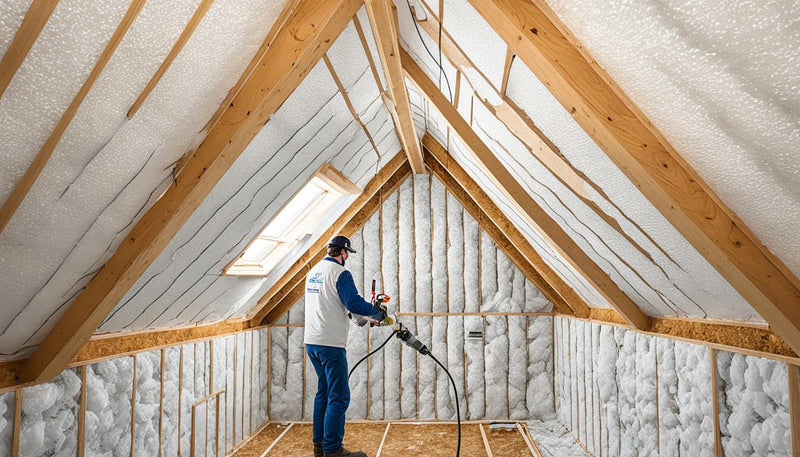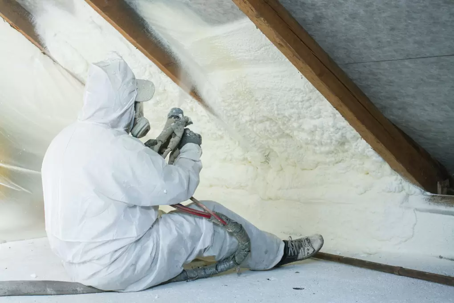The Process of Using Spray Foam: What You Required to Know
The Process of Using Spray Foam: What You Required to Know
Blog Article
Leading Factors to Choose Spray Foam for Your Following Insulation Task
When thinking about insulation alternatives for your next job, spray foam attracts attention due to its excellent efficiency characteristics and performance benefits. Its exceptional R-value not just boosts thermal resistance but likewise adds to substantial energy cost savings with time. Additionally, the product's capacity to create a closed seal effectively decreases air seepage and decreases the risk of moisture-related problems, such as mold and mildew growth. As you evaluate your choices, checking out the flexible applications and long-term advantages of spray foam might expose compelling factors to include it right into your insulation technique.
Superior Insulation Performance

The high R-value of spray foam, which measures its thermal resistance, is an additional vital benefit. Closed-cell spray foam, as an example, can achieve an R-value of approximately 6.5 per inch, significantly exceeding fiberglass batts and cellulose. Additionally, spray foam insulation produces an airtight seal, which decreases thermal connecting and decreases the capacity for mold growth due to moisture accumulation.

Energy Efficiency Benefits
The energy effectiveness benefits of spray foam insulation are considerable, more boosting its appeal as a top selection for building insulation. One of the main advantages is its exceptional thermal efficiency. Spray foam broadens upon application, developing an impermeable seal that lessens air leakages, which is an usual resource of energy loss in traditional insulation materials. By efficiently minimizing thermal connecting, it preserves a constant indoor temperature, thus reducing cooling and heating costs.
In addition, spray foam insulation boasts a high R-value per inch, which means it offers extra thermal resistance in much less space contrasted to options like fiberglass or cellulose (Spray Foam). This efficiency not only adds to prompt power savings yet likewise advertises long-lasting sustainability by reducing the total energy intake of a building
Furthermore, the application of spray foam can qualify home owners for power efficiency motivations and tax credit reports, adding economic benefits to its energy-saving capacities. In an era where power conservation is paramount, selecting spray foam insulation not just enhances convenience yet also straightens with ecologically responsible methods, making it a sensible choice for both household and industrial jobs.
Dampness and Mold Resistance
Offered its unique composition and application method, spray foam insulation uses remarkable dampness and mold and mildew resistance, making it a suitable choice for numerous environments. The closed-cell structure of spray foam produces a strong obstacle that efficiently secures off possible dampness ingress, therefore lowering the likelihood of mold growth. Unlike standard insulation products, which can absorb water and offer a breeding place for mold and mildew, spray foam remains invulnerable to dampness, boosting the overall health and wellness of the interior environment.
Additionally, the application procedure of spray foam involves expanding and filling up gaps and splits, ensuring a tight seal that minimizes air leakages. This particular not only improves power performance however also aids control moisture levels within the space. Correct moisture control is important for avoiding mold and mold, making spray foam insulation especially beneficial in locations susceptible to dampness, such as basements and creep areas.
Along with its moisture-resistant residential properties, spray foam is likewise inherently immune to mold and mildew growth. This particular makes sure that buildings and homes stay healthy and balanced and safe over time, giving satisfaction to house owners and building managers alike.
Long-Term Price Cost Savings
Purchasing spray foam insulation yields substantial long-lasting cost financial savings, primarily via enhanced power performance. Unlike conventional insulation materials, spray foam develops a closed seal that lessens air leak. This reduction in drafts causes lower heating and air conditioning costs, as cooling and heating systems do not have to work as tough to maintain comfortable interior temperature levels.
Additionally, the remarkable insulating buildings of spray foam mean that look at this site homes stay continually comfy year-round, decreasing reliance on energy-consuming devices. With time, these savings can collect, causing a noticeable reduction in energy costs.
Additionally, spray foam insulation adds to the durability of your home's framework by protecting against moisture accumulation and mold growth, which can result in expensive repair services. With its durability and resistance to working out, spray foam keeps its effectiveness throughout the years, making certain that the initial investment proceeds to repay.
In essence, selecting spray foam insulation not just boosts your home's power performance but also translates right into considerable long-term economic advantages, making it a sensible financial investment for house owners looking to minimize costs while boosting comfort and sustainability.
Versatile Application Options
Various application alternatives make spray foam insulation an extremely flexible option for a variety of building projects (Spray Foam). This versatility allows it to be successfully used in property, commercial, and industrial settings, dealing with diverse insulation demands
Spray foam can be used in attic rooms, wall surfaces, creep spaces, and even roofing systems, supplying smooth insurance coverage that gets rid of gaps and voids where air leaks typically occur. Its capacity to broaden upon application ensures a limited seal, which is necessary for energy performance and wetness Bonuses control.
Moreover, spray foam insulation is readily available in different solutions, including open-cell and closed-cell kinds, enabling customized options based upon certain job demands. Open-cell foam is lighter and better matched for soundproofing, while closed-cell foam offers premium insulation and structural honesty, making it perfect for locations exposed to wetness.
In addition, spray foam can be applied in hard-to-reach rooms, enhancing its suitability for retrofitting existing frameworks. With the ability to abide by different substrates, including metal, timber, and concrete, spray foam insulation attracts attention as a flexible alternative that meets the needs of modern-day building methods.
Final Thought
In conclusion, spray foam insulation emerges as a remarkable alternative for insulation tasks due to its phenomenal thermal resistance, power performance, and ability to create airtight seals that prevent moisture and mold growth. The long-term price financial savings connected with reduced energy costs better boost its appeal. Additionally, its versatility in application throughout different setups underscores its functionality and performance. Choosing spray foam insulation guarantees a thorough solution that fulfills the needs of modern-day building and construction and power effectiveness requirements.
When it comes to achieving optimum energy efficiency in commercial and household buildings, spray foam insulation stands out for its superior insulation efficiency.The energy performance benefits of spray foam insulation are substantial, further boosting its allure as a top selection for developing insulation.Spending in spray foam insulation yields substantial long-term expense savings, mostly through improved power efficiency.In final thought, spray foam insulation emerges as a premium option for insulation jobs due to its remarkable thermal resistance, power efficiency, and capability to this link create closed seals that protect against wetness and mold and mildew growth. Choosing spray foam insulation makes certain an extensive option that meets the demands of modern-day construction and power efficiency requirements.
Report this page